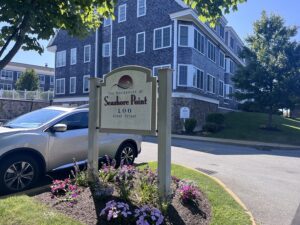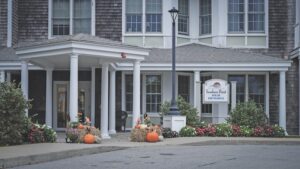PROVINCETOWN — Since taking over the nursing home at Seashore Point in 2019, the current owners have used a complex network of companies to pay themselves hidden profits — possibly totaling over $1 million — while cutting nursing staff hours dramatically, according to expert analysis of the company’s federal and state filings.
Christopher Cherney, an expert in nursing home administration, reviewed Seashore Point’s cost reports. His investigation found several irregularities, which in his opinion suggest that the data submitted to Medicare and Medicaid may have been fraudulent to hide payments to owners.
In his analysis comparing the facility’s 2021 Medicare and Medicaid reports, Cherney found that the owners appear to have paid their own companies up to 35 cents of every dollar the facility brought in. The amounts reported to federal and state authorities differ dramatically, however, and Cherney said it cannot be known how much of the payments to their own companies was actually profits. Payments from the facility to other owner-controlled companies, only some of which appear to have been disclosed, could have been potentially as high as $1.5 million in 2021 alone, according to Cherney’s preliminary analysis.
Ernest Tosh, a Texas-based lawyer who specializes in nursing home abuse and neglect cases, also reviewed the facility’s data and filings. He found evidence that, in his opinion, suggested that the owners failed to consistently and accurately report “related parties,” the technical name for companies controlled by the facility’s owners or their family members.
Tosh told the Independent that overpaying related parties is one of the most common ways for-profit nursing homes siphon extra money to owners while maintaining a bottom line that reports only small profits or small losses.
“If these facilities were actually losing money, why would private equity keep buying them?” said Tosh.
An analysis of the related companies that Seashore Point did disclose on its Medicare cost reports from 2020 to 2022 found that the owners appear to have pocketed at least $1,204,482 from self-reported overpayments to a management company, rent company, rehabilitation company, and payroll company.
“You got an additional million dollars of profitability that nobody knew about,” said Tosh.
Investigators from the Mass. Dept. of Health and Human Services found 11 deficiencies in their last inspection of the Seashore Point nursing home, which has been fined more than $32,000 by the state since 2020.
Preliminary Findings
Every skilled nursing facility in the country that receives Medicare or Medicaid reimbursements is required to file cost reports with information about revenue streams, payroll, assets, and expenses. The owners must attest that the reports are accurate under penalty of perjury.
In his analysis, Cherney used the 2021 reports because 2021 is the most recent year of Medicaid data published by the Mass. Center for Information and Analysis.
Multiple budget lines in the nursing home’s Medicaid cost report did not pass the “smell test,” said Cherney. One of the most confounding was $266,440 that the facility reported in advertising expenses for 2021. He called that number for a 41-bed nursing home with a 91-percent occupancy rate and without any apparent nearby competitors “unprecedented.”
“I’m trying to understand this advertising fee, and it doesn’t square with my experience,” said Cherney. “It’s a potential place to hide profit.” If the number reported was accurate, then the nursing home would have spent over $22,000 per month on advertising in 2021.
The Independent asked AdviniaCare, the company that operates the nursing home, for evidence of advertising expenditures, such as an invoice to a marketing company. The company’s media specialist did not respond to that request but referred instead to a statement saying that AdviniaCare complies with all federal and state regulations.
Cherney calculated that the reported advertising budget alone would pay for about 26 more hours of nursing care per day on average, an increase of about 25 percent.
AdviniaCare’s Pleasant Bay of Brewster Rehab Center reported advertising expenses of $661,269, according to its 2021 Medicaid cost report.
The Seashore Point nursing home also reported spending $71,932 — about $6,000 per month — for software support. Cherney said that makes “no sense” for a 41-bed nursing home.
Cherney, who serves as an expert witness in nursing home cases in California, said that he came to his preliminary conclusions with a “reasonable degree of certainty with respect to nursing home administration.” But he also said there were still unknowns about Seashore Point’s finances.
Some of the “related parties,” or owner-controlled companies, disappear in the Medicare or Medicaid reports. According to Illinois business records, Benjamin Berkowitz, one of three current owners of Seashore Point, is a manager of the reported management company called Pointe Group Care LLC. According to Massachusetts business records, he is the manager of 100 Alden St. LLC, which is the rent company.
Yet in the 2021 Medicaid cost report signed by Berkowitz, he did not disclose either company as a related party. The result is $820,283 in dealings between Berkowitz’s companies not disclosed as related-party transactions.
AdviniaCare declined to provide an explanation of why these companies were not reported as related parties in the Medicaid cost report.
“I don’t know what to make of that, except that it is not true,” said Tosh, the expert on nursing home abuse and neglect, when he reviewed the discrepancies between the two reports.
Seashore Point’s owners, Benjamin Berkowitz, David Berkowitz, and Yosef Meystel, declined the Independent’s request for an interview through their media consultant. The statement from AdviniaCare reads: “We are committed to our patients, residents and employees and that is why we continue to invest in this facility. We are proud to operate the only skilled nursing facility on the Outer Cape — the next nearest nursing home is 31 miles away. In response to the Independent’s questions about information that differs between the Medicare and Medicaid cost reports, the two programs require different information — this is why they don’t simply share the same form. We have provided all of the necessary information and disclosures to the government. The operations of AdviniaCare Seashore Pointe are structured no differently than most nursing homes, and comply with federal and state regulations.”
The company’s media consultant did not answer questions about the number of employees at the management company, rent company, rehabilitation company, and payroll company that are listed as related parties. The consultant also declined to provide an explanation for the discrepancies between the Medicare and Medicaid reports.
Standard Practice
According to a report called “Where Do the Billions of Dollars Go?,” the proliferation of nursing homes using related parties started after a 2003 article appeared in the Journal of Health Law. The article suggested that nursing homes restructure and create multiple single-purpose corporations to protect the owners from civil judgments.
Since then, the use of companies controlled by shared interests has skyrocketed in the industry. Nearly three-quarters of all nursing homes used related-party transactions in 2015. That year, related-party transactions totaled $11 billion, according to an analysis of Medicare cost reports by the authors of a 2021 Health Affairs article.
In a research paper released this spring, professors Ashvin Gandhi and Andrew Olenski found that as much as 68 percent of all nursing home profits were hidden by “tunneling,” or “covert profit extraction” using related parties. Gandhi and Olenski found that 77 percent of profit tunneling occurred through rent and management companies.
Payments made to related parties show up as expenses on the bottom line. So, while Medicare cost reports from 2020 to 2022 suggest that the nursing home in Provincetown made $1,204,482 in overpayments to owner-controlled companies, the nursing home itself reported a net loss of $415,997 for those years.
“It’s very common for these facilities to report very small positive or very small negative profit margins,” said Olenski. “My suspicion is that often the reason why your expenses are just right at your revenues is that you have chosen the prices of your rent or your management fees to make your expenses right in that range, just right above or just below.”
“The financial practices employed by Seashore Point are extremely common across the country,” said Sam Brooks, the director of public policy at National Consumer Voice for Quality Long-Term Care, an advocacy organization focused on improving nursing home care. “Ultimately, the blame lies with federal and state governments that fail to ensure that tens of billions of Medicare and Medicaid dollars are going toward resident care and not to owners.”
“There’s no real enforcement mechanism that the Centers for Medicare and Medicaid Services has to ensure the data you’re submitting is accurate,” Olenski told the Independent.
“They don’t realize the amount of suffering that is going on in the nursing homes that could be prevented if we understood the financial situation,” said Tosh. “The system is broken.”
The facility’s previous owner, the nonprofit Deaconess Abundant Life Communities, did not report a single related party transaction in its Medicare cost reports for 2017 or 2018.
The nursing home at Seashore Point is connected to independent-living condominiums. In a November 2022 letter obtained by the Independent, Benjamin Berkowitz informed the condominium owners that concierge fees at the condos would increase from $250 to $600 per month for a one-bedroom apartment. Berkowitz cited “significant losses over the past several years” that Seashore Pointe Service Co., LLC, another of his companies, incurred in his decision to hike the fees.
As previously reported by the Independent, the condominium owners have filed a lawsuit against Pointe Group Care, the corporate owner of Seashore Point, claiming fraud and elder abuse.


